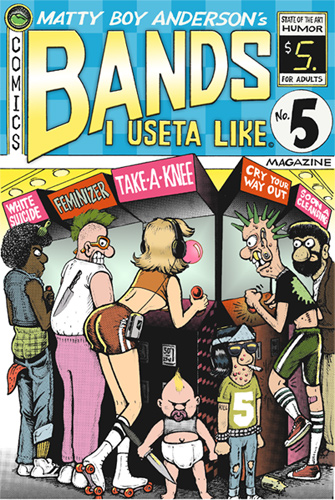“Pork and Beans” is the Weezer video that incorporates a deluge of idiots from YouTube. Even the stupid cocktease with rainbow socks who sued anyone who was mean to her. Even the twink who cried about Britney Spears. Even the fat lip-syncing kid who thinks people actually like him. It’s like a convention for useless people who’ll be forgotten until somebody watches an old South Park.
Yeah, remember when South Park made a stink about the cutaway gags in Family Guy, claiming it was all random ideas picked by manatees? Then South Park did an entire episode where Internet memes literally battled each other, after reciting their identifying catch-phrase. That’s called “hypocrisy”. That’s why Family Guy didn’t do a “dis” show in revenge on South Park. It’s the better show.
One could argue that the “Pork and Beans” video is the 21st century equivalent of the one for “Buddy Holly”, with its re-creation of TV’s Happy Days. I truly hate this song, but this was pretty much our last view of Al Molinaro, a wonderful comedy-Italian with a face like a proboscis monkey.
The “Buddy Holly” video was a cute idea, as Happy Days is fondly remembered by folks around my age (and Weezer’s). But in 2008, a new concept would irrevocably muddy the waters of common reference: “viral video”.
The problem with viral video is that it does not reward effort or craft. It spreads based on a gut emotional reaction from viewers. This can be laughter, derision, or disgust. Thus, you have videos reaching the highest echelons of society, spreading wholly on the natural desire to know what the fuck everyone is talking about.
The makers of viral videos are like career beggars. They have no real grasp of why the world suddenly paid them attention, and they get greedy for it, and become total monsters. They cannot parse the relationship between “views” and “money”. Despite their naïveté, they have an innate sense of their own disposability, and they fight like their lives are in danger. You either do what they demand, or they won’t work with you. They can’t understand that a few seconds in a Weezer video is the best they will ever do.

If your tits are spectacular enough, you can get away with all manner of bad Internet reference, and no one will care.
Am I wrong? Go back and watch that South Park with all the memes. Where’s ol’ “Chocolate Rain” now? How ’bout that “Numa Numa Kid”? Was it worth pandering to an infinitesimal demographic, that dried up in less than two years? You tell me; do you laugh, or cringe?
I’ll let you in on a little secret. Are you a regular guy, maybe a podcaster or a “YouTube celebrity”?
You will never be a movie star. You will never become a real celebrity.
Why? Because you already did it for free. You have nothing anyone in the movie industry would want.
Movie stars have something to lose; something expensive, coveted and visible. It could be property, a business, or even a connection with a powerful person. They don’t argue online because they know it holds no weight, and they simply don’t have the time. If they saw you arguing online they would laugh at you. There are 10,000 people lining up ahead of you to get their attention. You’re already dead.
Major rock bands are signed by contract to a record label. In 1993, Weezer was signed to Geffen Records. That’s Geffen as in David, and the G in Dreamworks SKG (the others being Spielberg and Katzenberg). A mogul with a capital M. Despite its alternative leanings, Weezer’s “Blue Album” was a major mainstream release, with a total marketing blitzkrieg. For 2008’s Weezer (“Red Album”), DGC (guess the acronym) did the same thing, and roped a passel of YouTube dopes along for the ride.
I mean, hey, why not stuff your fanbase with Manichean mental-cases? If you put the rainbow-socked cocktease in your video, you get new listeners, in the form of the handful of guys who wish they could fuck her. If the relationship goes sour (and it will), all you have to do is cut ties with her, and either she’ll take the opportunity to disappear out of shame, or put on a public show so pathetic, everyone will eventually avert their eyes. Problem solved, and cheap, too. If you pulled that shit on a real actor, you’d be sued into a soup kitchen.
Weezer continued their dedication to bad entertainment with 2010’s Hurley, and its attendant marketing miscarriage. See, Hurley’s cover was a picture of actor Jorge Garcia, of the TV series Lost.
Listen, folks, I tell you this in all sincerity: I love you more than you can ever love yourself. It hurts me when you are lied to. It kills me inside.
Lost was co-created by one J.J. Abrams. As a moviemaker who will never enjoy acceptance within the mainstream, I must tell you one thing.
J.J. Abrams is a fraud.
He is touted as a creator of fictional universes: he is not. What Abrams does is what’s good for serial television: he creates a set of impossible scenarios and random ideas, and says “now you deal with it.” He did this with Lost, Cloverfield, Star Trek, and most damningly, Star Wars. You can accept this, or you can continue to be disappointed. All that matters in Hollywood is that you have the image and the ideas. They don’t have to make sense, or be good for the medium. It became clear that audiences wanted one specific thing from Star Wars; Abrams gave it to them. He did the job he was hired to do and nothing more. There is no “universe” beyond what he shows you. It’s the best he can do. In time, you’ll see.
Remember when Lost was the talk of the town? Where is it now? When was the last time anyone spoke of it with anything but scorn?
So, Weezer put this fictional character from this deservedly forgotten TV show on their album cover, and confused everyone. At first Weezer claimed to be huge fans of Lost and Garcia, which is hard to believe since 2010 was around the time the show tanked itself. Then it was rumored to be a prank. Finally it came out that Weezer worked with a clothing company called Hurley International, whose bosses had funded the recording of the album, even providing a studio.
Yeah, why would you bother with album art if you’re sucking corporate cock? Why not just use a picture off the Internet? Why hire an artist to make your album look worthwhile?
In retrospect, Weezer stands for pusillanimous rock, maximum attention for minimal effort, and negative marketing paradigms. And clothes, I guess.













You must be logged in to post a comment.